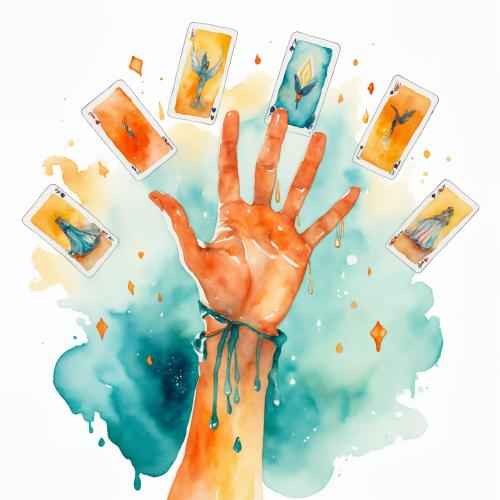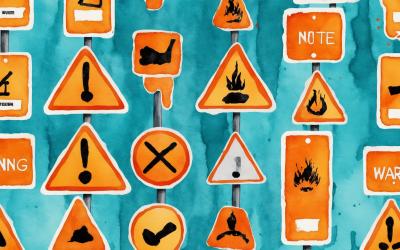While saying "yes" might feel like good customer service, sometimes the most ethical - and helpful - response to a tarot query is a firm but gentle "no." Understanding when and how to decline readings is as important as mastering card interpretation.
"The first principle is that you must not fool yourself - and you are the easiest person to fool," physicist Richard Feynman once observed. As someone who's occasionally fooled themselves into thinking "just one more reading" might help a struggling client, I can attest to the wisdom of these words.
Medical and Legal Matters: The Clear Lines
Some boundaries aren't up for debate. Medical and legal questions aren't just outside our scope - they're potentially dangerous territory. When someone asks whether they should stop their medication or proceed with a lawsuit, the answer isn't in the cards. It's rather like being asked to perform surgery with a deck of cards - entertaining perhaps, but probably not going to end well for anyone involved.
A proper response might be: "I understand you're seeking clarity about your health situation. While tarot can help explore your feelings about it, medical decisions need medical expertise. Have you discussed these concerns with your doctor?"
Mental Health Crises: Reading the Signs
I've written before about tarot dependency - that tricky situation where readings become less like helpful guidance and more like your friend who can't stop checking their ex's Instagram. Sometimes people need something more substantial than another card reading.
Watch for signs that someone might need professional support:
- Seeking readings multiple times about the same issue (If you can recite their problem from memory, that's probably a sign)
- Expressing thoughts of self-harm
- Showing signs of severe anxiety or depression
- Using readings to avoid making decisions (Yes, the cards say you should make a decision about making decisions...)
In these situations, compassion means referring them to appropriate mental health resources. Think of it as being a good bouncer - sometimes the kindest thing is pointing people toward the exit and calling them a taxi.
Manipulative and Third-Party Questions
Some queries sound innocent enough: "Will my ex come back?" "What is my boss thinking?" "How can I make someone love me?" These questions share a common thread - they attempt to use tarot as a sort of cosmic CCTV to spy on others without their consent.
As I mentioned in my article on tarot etiquette, reading about others without their permission is rather like reading their diary - just because you can doesn't mean you should. Instead, help querents refocus on themselves:
- "What can I learn from this relationship?"
- "How can I improve my work situation?"
- "What patterns in my relationships need attention?"
The Grey Areas
Not every ethical decision comes with flashing neon signs pointing the way. Questions about pregnancy, career changes, or financial investments occupy a murky middle ground. While I can't predict whether your cryptocurrency investment will make you a millionaire (if I could, I wouldn't be writing this blog), I can help you explore your relationship with risk and decision-making.
Setting and Maintaining Boundaries
Professional boundaries protect both reader and client. This means having:
- Clear policies about what types of readings you offer (and don't)
- Prepared responses for common problematic requests
- A referral network of mental health professionals, legal advisors, and other experts
- Regular check-ins with yourself about your ethical lines
Think of boundaries like the barriers at a bowling alley - they keep things rolling smoothly and prevent everyone's balls from ending up in someone else's lane. (I promise that's my last metaphor for at least two paragraphs.)
When and How to Say No
Declining a reading doesn't require a dramatic scene worthy of a soap opera. Some effective approaches:
- "That's beyond the scope of what tarot can ethically address. However..."
- "I understand you're looking for answers, but this isn't something I'm comfortable reading about."
- "While I can't read about that specifically, we could explore..."
Follow these with concrete alternatives or referrals when appropriate. You're not crushing dreams; you're redirecting energy to more constructive channels.
Alternative Approaches
Often, problematic questions can be reframed into constructive exploration:
Instead of "Will I get the job?" try "What can I do to prepare for this opportunity?"
Rather than "Is my partner cheating?" explore "How can I build trust in my relationships?"
Replace "When will I find love?" with "How can I open myself to meaningful connections?"
The art lies in maintaining the essence of their question while shifting focus to areas where they have agency.
Professional Development and Self-Care
Maintaining ethical boundaries requires ongoing learning and self-reflection. Consider:
- Regular supervision or peer discussion groups
- Continuing education in counselling skills and ethics
- Personal therapy or supervision
- Clear policies about self-care and professional limits
The ability to say "no" isn't just about ethics - it's about sustainability. Every reading you appropriately decline is an investment in your professional integrity and personal wellbeing. It's like putting on your own oxygen mask before helping others, except instead of oxygen, it's maintaining professional boundaries.
Moving Forward
Professional readings aren't about providing every answer - they're about offering appropriate guidance within clear ethical boundaries. When we say no to readings that cross these lines, we're saying yes to being responsible practitioners.
Remember, you're not running for Most Popular Tarot Reader of the Year. You're here to provide a valuable service within appropriate professional boundaries. Sometimes that means being the voice of reason when someone is looking for magical solutions.
And if you're ever unsure? Err on the side of caution. No one ever looked back on their career and thought, "I really wish I'd been less ethical."






